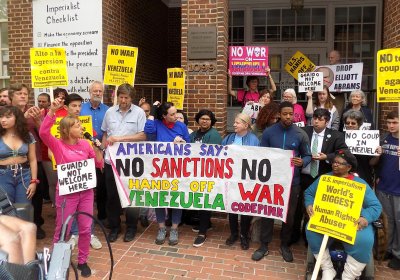The Australian government should re-consider its confused policy towards Venezuela and once again recognise the elected government of President Nicolas Maduro, writes Chris Slee.
Juan Guaido
The only “real” democratic institution in Venezuela, according to United States State Department spokesperson Ned Price, is one that has not met in seven years, writes Vijay Prashad.
Opposition leader Juan Guaido installed a “parallel” parliament in Caracas on January 7.
The self-proclaimed “interim president” led a group of deputies in a standoff with security forces outside the Legislative Palace in Caracas, while the National Assembly (AN) held its regular session inside. The session was led by newly-elected AN President and Yaracuy State Deputy Luis Parra, who announced the creation of a commission to “restore” constitutional order.
The border between Venezuela and Colombia has been partially reopened after nearly four months.
The principal crossing posts of the Simon Bolivar and Francisco de Paula Santander International Bridges — which connect Venezuela’s Tachira State with Colombia’s Northern Santander Department — were reopened on June 8 for pedestrian crossing. They still remain closed for vehicles.
At 9.30am on May 16, police officers illegally entered the Venezuelan embassy in the Georgetown neighbourhood of Washington DC and arrested four activists lawfully living in the building since April 10, as guests of the legitimate Venezuelan government of Nicolás Maduro.
Self-declared Venezuelan Interim President Juan Guaido has ordered the setting up of a meeting with the United States Armed Forces to discuss cooperation in his efforts to oust President Nicolas Maduro, writes Paul Dobson.
The recognition by some states of the self-proclaimed government of Juan Guaidó in Venezuela has generated an unprecedented political and legal controversy.
Forget about the right-wing opposition and its self-proclaimed “interim president” Juan Guaidó — the fate of Venezuelan president Nicolas Maduro will be decided by the political movement forged under his predecessor, writes Federico Fuentes.
Given the media barrage surrounding Venezuela’s “humanitarian crisis”, recent tensions on the Venezuela-Colombia border, and talks of “military options” and coup attempts, it was hard to know what to expect on returning to the country for the first time in five years, writes Federico Fuentes.
One month after declaring himself the “legitimate president of Venezuela”, Juan Guaidó attempted to provoke a crisis on February 23 by forcing United States' humanitarian aid across the Venezuela-Colombia border. Here Elisa Trunzo asked Jose Curiel for his account of what happened at the border that day.
Below is a February 4 letter signed by 39 members of the European Parliament. It comes from three different political groups in the European Parliament and condemns EU support for the attempted coup in Venezuela.
***
Letter in defence of a political dialogue in Venezuela, guaranteeing that Latin America and the Caribbean remains a zone of peace.
Corporate media outlets in Australia and internationally are overwhelmingly campaigning in support of the United States’ regime change push in Venezuela. This is another reason to support Green Left Weekly.
- Page 1
- Next page











